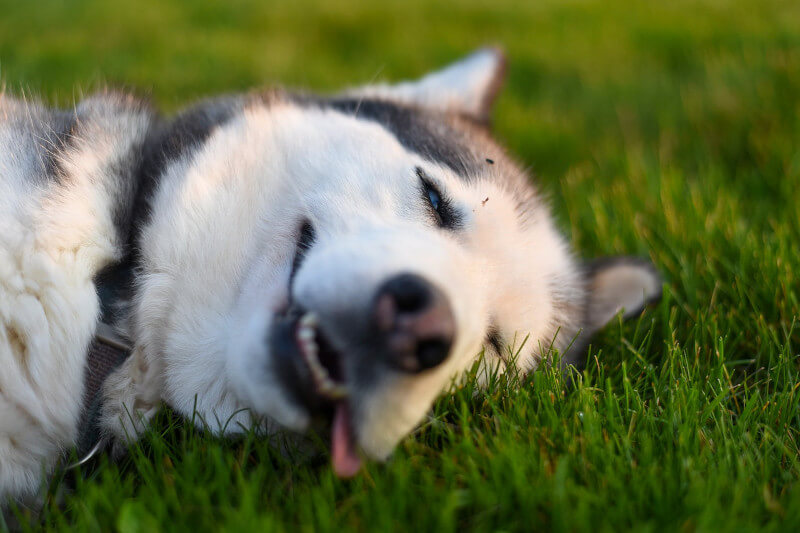You have a Husky, we get it!
We are all aware of how difficult the breed can be to train in terms of their behavior, but the payoff for the effort required to train them is something that very few other breeds can offer.
Huskies are more susceptible to certain types of medical conditions, which, if you are aware of them, can make diagnosis, treatment, and managing them that much simpler, leaving you more time to cope with the enormous ditches that they have dug in your vegetable patch. Just as their character traits are special and peculiarly demanding, so are the medical issues that Huskies are more likely to develop.
Their Skins Can Often Cause Irritation
When we think of Huskies, the first thing that springs to mind is their skin. There is a wide variety of afflictions of the skin that could affect your Husky.
A basic form of dermatitis, which merely refers to an allergy to something in their surrounding environment, can affect Huskies on the most fundamental level. This condition is known as atopic dermatitis. This could be sand, pollen, or even mold; think of it as the canine equivalent of hay fever. On the other hand, the symptoms present themselves as severe skin irritations.
It’s possible that your dog constantly licks the bottoms of its paws and bites the nails of its paws. Dermatitis in dogs can cause the skin to become very itchy, which can be a very stressful condition for the dog. It’s also possible to experience hair loss. You must take your dog to the veterinarian irrespective of the symptoms that he is displaying. Your veterinarian may recommend a variety of treatments, such as determining which aspects of your dog’s environment are contributing to the problems and removing or reducing those aspects as much as possible, or possibly supplementing your dog’s diet.
Keep Your Dog Fit and Lean
Huskies, which are of the medium-sized breed, are susceptible to developing hip dysplasia and arthritis just like any other breed. Your dog may have difficulty getting up from a lying position when it first begins to show symptoms of arthritis. You may also observe that your dog walks lamely and with obvious discomfort as the disease progresses. The earlier you diagnose arthritis in a dog, the better chance you have of successfully treating it. Likewise, maintaining a healthy weight for your dog is essential to preventing a variety of health problems and ensuring that he continues to enjoy an excellent quality of life.
Consult with the veterinarian of your choice if you are uncertain as to whether or not your dog is overweight. The weight that was recorded for your dog when they were approximately ten months old is a suitable weight to use as a baseline for their weight, even though you may not have that specific figure written down. You can also pet your dog by running your fingertips along the side of his body. There is a good possibility that your dog is overweight if you are unable to feel its ribs when they are bent over.
How Warmer Climates Affect Your Husky

Because prolonged exposure to high temperatures can cause itchy spots on your Husky, living in our hotter climate does not end up making the life of a longer-haired Husky any simpler. As is the case with dermatitis, you and your veterinarian can work together to find ways to provide immediate relief for the symptoms, such as the use of supplements or medical care.
In very warmer climates, some individuals opt to shave their Huskies, but this is a contentious topic because the hair may not always regrow nicely, and your dog may develop a condition known as “post-clipping alopecia.”
As if the Pressure They Were Under to Run Wasn’t Enough
The condition known as hypothyroidism, which is characterized by low levels of thyroid hormone in dogs, came up quite a bit in the conversations that we had with our veterinary colleagues. The symptoms of low thyroid hormone levels include things like dry skin and a coat that feels notably rougher, as well as things like gaining weight, loss of hair, and even behavioral issues. Even though it may sound frightening, the treatment for this condition is typically quite straightforward and consists of simply taking a pill that your veterinarian will provide to complement their natural hormone levels.
Conclusion
This article does not cover all of the health problems that your Husky may experience throughout its lifetime; however, if you keep a close eye on the state of your Husky’s coat and skin, you will have a good chance of detecting many of the problems that affect Huskies. Keeping a healthy weight in your dog or cat by ensuring they receive the appropriate nutrition and engaging in regular exercise is one of the least difficult and most beneficial things you can do to ensure their long-term happiness and well-being.

